
Nuclear Weapons
The Trump administration’s Nuclear Posture Review put forward numerous controversial positions that have stimulated debate on such issues as whether the US should continue to maintain and extend nuclear arms control treaties, whether the US needs to have its current nuclear capabilities and whether new capabilities need to be developed. There are also debates about whether the US should maintain its current policies on using nuclear weapons first and current legislation that would restrict the President’s ability to use nuclear weapons first.
- National Sample: 2,264
- Margin of Error: +/- 2.1%; Sample A/B: +/- 2.9%
- Fielded: January 7 - February 1, 2019
- Questionnaire with Frequencies (PDF)
- Full Report (PDF)
Proposals covered:
- Continuing to have arms control treaties with Russia
- Extending the New START arms control treaty
- Continuing to abide by the moratorium on nuclear testing
- Having a nuclear arsenal that meets the minimum retaliatory capability
- Phasing out land-based missiles (ICBMs)
- Requiring the President to get a declaration of war from Congress before launching a nuclear first-strike
- Changing the policy of the US on whether it will launch a nuclear weapon first
- Developing low-yield nuclear warheads to put on submarines
- Withdrawing from the INF Treaty or staying in and redoubling efforts to work with Russia
There were no proposals that failed to receive bipartisan support.
|
HAVING ARMS CONTROL TREATIES |
|
Currently the US has a variety of arms control agreements with Russia, dating back to the Cold War. A number of voices in the Trump administration have challenged the utility of such arms control agreements, and as of this writing (subsequent to this study) have withdrawn from a major arms control agreement on intermediate range nuclear arms. In setting the context for questions on nuclear arms control, respondents were told about the condition of mutual vulnerability between the U.S. and Russia, meaning that each can inflict massive devastation on the other, regardless of who attacks first. This has been the case since the 1950s, essentially unchanged by technological developments. They were informed that, “countries with smaller nuclear arsenals also have the potential to inflict massive damage on each other.” They were told how the U.S. and other countries have developed a number of treaties to limit and reduce nuclear weapons. After being given a summary of the most important provisions of the Nuclear Non-Proliferation Treaty (NPT), they were asked whether they were aware that “that the U.S. has agreed to actively work together with other nuclear powers to reduce and ultimately eliminate all nuclear weapons.” Four fifths (82%) said they were aware of this basic commitment on the U.S.’s part; partisan differences were minor. They were then introduced to the topic of US-Russian nuclear arms control treaties by reading that the U.S. and Russia (previously the Soviet Union) “have entered into a number of treaties that have substantially reduced the number of nuclear warheads on each side” and that extensive inspection systems were put in place to verify this. They were told “There is some debate about these U.S-Russian arms control treaties,” and presented an argument in favor and an argument against such treaties. The argument supporting the treaties pointed out that the U.S. and Russia “have dismantled thousands of nuclear weapons” thanks to their framework and said mutual suspicion has been reduced relative to the Cold War years. Seven in ten (69%) found this argument convincing, including 67% of Republicans and 74% of Democrats but less independents (62%). Democrats, Republicans and independents were all at 80% or higher. Respondents who voted for Donald Trump and those who voted for Hilary Clinton were no different—in both cases 83% were in support. |
|
There is currently a debate over whether the US should extend the arms control treaty it has with Russia - the New Strategic Arms Control Treaty (START). After receiving a briefing on arms control treaties between the US and Russia, and hearing arguments for and against their continued usefulness, respondents were told that “Another debate is over whether the U.S. and Russia should extend an arms control agreement called the New START Treaty.” They were given a briefing on the Treaty as follows: It was signed in 2010 and approved by the U.S. Senate by a vote of 71-26. The Treaty requires each side to limit its deployed strategic nuclear warheads (the kind that can reach the other country) on land-based missiles, submarine-launched missiles and long-range bombers to equal levels. Extensive verification systems were put in place. There are now 18 on-site inspections per side each year, plus various forms of information sharing about each side’s arsenal. The New START Treaty expires in 2021 but can be extended for five years if both sides agree. Respondents evaluated arguments for and against an extension of New START. The argument for extension was found convincing by well over four in five (84%), with little party differentiation. The argument against was found convincing by just 44%. A majority of Republicans considered it convincing, but not overwhelmingly so (55%). Only one-third of Democrats found this argument convincing and independents were divided. Status of Proposal New START was extended until 2026. A proposal has been put forward in the 118th Congress for the US to have a policy of working with Russia to further extend New START and resume on-site inspections, in the HALT Act of 2023 by Rep. James McGovern (D) (H.R. 3154) and Sen. Ed Markey (D) (S. 1499). |
|
A major arms control agreement that the US has signed and abided by is the international treaty banning nuclear testing. However the US has never ratified the treaty and there is some debate about whether the US should continue to abide by the treaty. See above for arguments for and against arms control agreements. Respondents first received background information on the Comprehensive Test Ban Treaty and the moratorium on nuclear explosions that covered the following points:
Respondents were then asked their views on “the U.S. continuing to abide by the moratorium on nuclear testing.” Nearly nine in ten (87%) approved, while 12% disapproved. This included 85% of Republicans, 90% of Democrats, and 83% of independents. Trump voters were 82% in support.
|
|
The Intermediate Nuclear Forces (INF) Treaty was signed by the US and the Soviet Union in 1987. Since then both sides have accused the other of violating the Treaty’s requirements. Some US officials, including President Trump, wanted to withdraw, while others wanted to stay in the Treaty and continue to work with Russia on resolving problems. After President Trump threatened to formally start the withdrawal process, legislation was introduced to keep the US in the Treaty by preventing funds from being used to build the kinds of weapons banned by the Treaty: Prevention of the Arms Race Act (H.R. 1231, S. 312). In February of 2019, the US officially withdrew from the INF Treaty. Previous to the US withdrawing from the Treaty, respondents were introduced to the debate over whether the US should stay in the INF Treaty with some background on the topic: This treaty was signed by former President Ronald Reagan and Mikhail Gorbachev in 1987. It prohibits the U.S. and Russia (then the Soviet Union) from having land-based missiles with flight ranges between 310 to 3,420 miles. It was the first treaty to ban a whole class of weapons and included unprecedented on-site inspections. They were told that “The U.S. has accused Russia of violating the treaty, but Russia has denied it. Similarly, Russia has accused the U.S. of violating the treaty, but the U.S. has also denied it.” Respondents were then informed that there is a debate about whether the US should withdraw from the treaty and that for the U.S. to withdraw, it must first formally announce that intention (as it in fact did on February 2, 2019, one day after fielding ended for this study). A six-month interval must ensue before withdrawal takes place. Respondents first evaluated an argument in favor of the U.S. withdrawing from INF. About two in three (65%) found this argument convincing. The counter argument—which favored maintaining INF—did slightly better than its counterpart.
Two thirds (66%) chose to stay in INF and go back to the table with Russia; 30% chose withdrawal. Although it was being reported in the news at the time of the fielding that the Trump administration was preparing to initiate the formal withdrawal process, 55% of all Republicans preferred to stay in. In February of 2019, the US officially withdrew from the INF Treaty. |
|
NUCLEAR WEAPONS CAPACITIES |
|
Since the US began building its nuclear arsenal, there have been debates about how large and capable it should be. Respondents were first introduced to the idea of a minimum requirement for a U.S. nuclear arsenal as follows: Some people say that the U.S. should have an arsenal that meets the following minimum requirement: As long as other countries have nuclear weapons, the U.S. must have, at a minimum, enough nuclear weapons that could not be destroyed by an all-out surprise nuclear attack, so that the U.S. could always retaliate with a major nuclear strike. This potential retaliatory strike needs to be destructive enough that no country could think that there would be any advantage in attacking the U.S. with nuclear weapons. They then evaluated arguments for and against the U.S. having an arsenal that meets this minimum. The argument in favor elicited near consensual support, with 85% finding it convincing . All partisan groups showed eight in ten or more finding the argument convincing, as did all the sets of districts. The counter argument got a divided response, with 50% finding it convincing. The response was distinctly partisan: 37% of Republicans found it convincing, as compared to 60% of Democrats.
|
|
The US’ land-based nuclear missiles (ICBMs) are aging out and there is a debate about whether or not they should be phased out. Respondents were first informed about the debate as follows: “The U.S. has about 400 [ICBMs] that are active and ready to be used. All of them are aging and are scheduled to be replaced by 2030. However, some people say that they should not be replaced, but phased out instead.“ The argument in favor of phasing out ICBMs and the argument against were both found convincing by about seven in ten.
Only a third (32%) wanted to replace the ICBM force with new land-based missiles (Republicans 41%, Democrats 24%). Three in five (61%) chose one of the two options that would phase out land-based missiles including 53% of Republicans and 69% of Democrats. Thirty-three percent thought that having 1,150 warheads on submarines and bombers was enough (Republicans 20%, Democrats 42%), while 28% favored increasing the number of U.S. warheads on submarines and bombers to 1,550 (Republicans 33%, Democrats 26%). |
|
FIRST USE OF NUCLEAR WEAPONS |
|
There has been concern that the President has too much authority over the use of nuclear weapons. This has sparked debate over whether a nuclear first-strike should fall under the power of the President or Congress. To address this concern, Members of Congress have introduced legislation, the Restricting First Use of Nuclear Weapons Act (H.R. 669, S. 200), that would require the President to consult Congress and request a declaration of war before making first use of nuclear weapons. This is the proposal that was presented to respondents Respondents were first reminded that “only the President has the authority to order the launch of nuclear weapons and he is not required to consult with or get approval from Congress.” They were told that in the proposed legislation, the President would keep “the authority to use nuclear weapons in response to the launch of a nuclear strike against the U.S. or an ally.” But to use nuclear weapons first would require Congressional consultation, and Congress would have to vote to declare war. The argument favoring the legislation was found convincing by four in five (78%). The counter-argument was not received nearly as well, with a modest majority (53%) finding it convincing. There was a strong partisan divide, with 75% of Republicans giving weight to the counter- argument, but only 34% of Democrats. Independents were divided.
Two-thirds (68%) thought the bill should be passed into law. This included 59% of Republicans and 74% of Democrats agreeing (Independents, 73%). Only thirty percent of all respondents opposed legislation requiring the president to get Congressional approval before starting a nuclear war. |
|
There has been a debate over whether the U.S. should declare in advance that it would consider a nuclear response to a variety of non-nuclear strategic attacks. This possibility was discussed in the most recent Nuclear Policy Review, including a consideration of a number of specific types of non-nuclear attacks that might warrant a nuclear response. Respondents were introduced to the issue as follows: Right now, the United States promises never to use or threaten to use nuclear weapons against countries that do not have nuclear weapons and have allowed international inspectors to verify that they are not trying to build them. But, for all other cases, the U.S. has been publicly ambiguous about whether it might use nuclear weapons first and under what conditions. U.S. officials, under some administrations, have commented that the United States would consider responding with nuclear weapons to a major non-nuclear attack on an ally (such as a Russian invasion of a NATO country), or one involving biological or chemical weapons. But this has not been a formal U.S. policy and such statements have varied with different administrations. Respondents were then asked to consider a proposal for the U.S. to declare it would consider using nuclear weapons first in certain named circumstances. The argument in favor of declaring the U.S. “will consider using nuclear weapons first in response to a number of specific types of non-nuclear attacks,” was found convincing by two thirds (68%) including majorities from both parties. An overwhelming majority (79%, Republicans 77%, Democrats 81%) chose one of the other two options:
Given a menu of options only a small minority of both Republicans and Democrats endorse the US ever using nuclear weapons first.
No opinion was expressed by 16% (Republicans 9%, Democrats 16%, independents 19%). (August 2016, YouGov) A small majority favors legislation prohibiting the US from using nuclear weapons first, but with slightly more Republicans opposed to such legislation than in favor:
|
|
IRAN NUCLEAR AGREEMENT |
|
In 2015 the US under the Obama administration and other major world powers entered into an agreement with Iran which required that it stop its nuclear program in exchange for lifting sanctions. The Trump administration in 2017 withdrew from this agreement, though all other signatories have continued to be part of it. There has been a debate about whether the US should recommit to the agreement. Respondents were presented with the following briefing material as part of an in-person deliberation hosted by Stanford University’s Center for Deliberative Democracy in September 2019: In 2015, the US, the European Union, Russia, and China convinced a relatively moderate Iranian government to agree to the Iran nuclear agreement. The terms were designed to restrict Iran’s nuclear research so that it would not be able to produce a nuclear weapon for at least ten years. In exchange, Iran would be able to trade with the rest of the world. The agreement did not aim to change the conservative, Islamic regime in Iran or to prevent Iran from supporting allied countries and groups in the Middle East. President Trump withdrew from the deal in 2018, citing Iranian non-nuclear missile testing and military operations in the Middle East, particularly in Syria and Yemen. He reintroduced sanctions and cut Iran off from US markets and banks. In early 2019, the International Atomic Energy Agency, the international organization charged with monitoring Iran’s compliance, certified that Iran was still complying with the nuclear part of the agreement. In May 2019, Iran’s president announced that Iran would re-launch its nuclear program in response to America’s withdrawal and sanctions. They were then presented with a proposal and arguments for and against: Proposal: The US should re-commit to the Iran Nuclear Agreement. Argument in Favor: The Iran agreement represents the best chance of preventing that country from developing a serious nuclear threat over the next five to ten years. There is no evidence that Iran has cheated on its commitments under the agreement to forego activities that could enable it to produce a nuclear bomb. Argument Against: Iran is the principal threat to stability in the Middle East, and the deal will not prevent it from acquiring nuclear weapons in the long run. The deal gives Iran economic resources and international credibility at a time when it is supporting terrorist groups and other allies who endanger both Israel and American troops in the Middle East. After receiving the briefing material and deliberating about the proposal in-person, they were asked for their final recommendation. On a 0-10 scale, with 5 being “in the middle”, 67% rated the proposal as favorable (6-10), including 83% of Democrats, but just 45% of Republicans. However, the total percent of Republicans not opposed to the proposal was 59%. Related Standard Polls
|




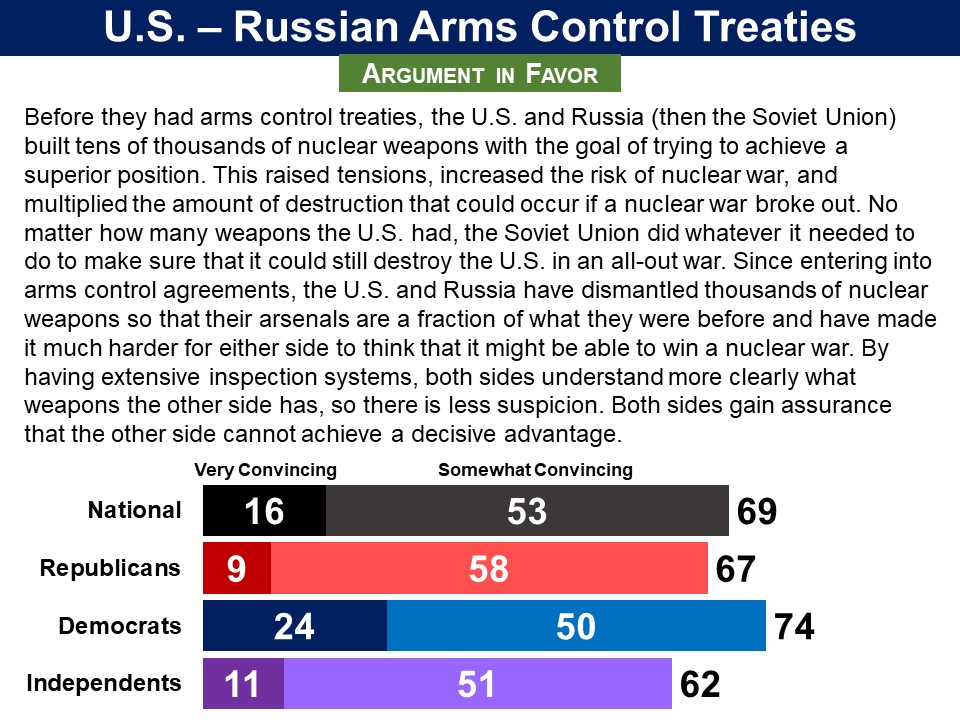 The counter-argument dismissed “the idea that we should accept that we are vulnerable to a devastating nuclear attack” and said that arms control treaties “tie our hands,” preventing the U.S. from leveraging its technological advantages to build a superior arsenal. It did not reject the idea of deterrence but argued superiority would enhance deterrence. Only 45% found this convincing, with parties significantly split. A clear majority of Republicans (58%) found it convincing, while only one third of Democrats did. In very red districts only, a bare majority of 51% found it convincing.
The counter-argument dismissed “the idea that we should accept that we are vulnerable to a devastating nuclear attack” and said that arms control treaties “tie our hands,” preventing the U.S. from leveraging its technological advantages to build a superior arsenal. It did not reject the idea of deterrence but argued superiority would enhance deterrence. Only 45% found this convincing, with parties significantly split. A clear majority of Republicans (58%) found it convincing, while only one third of Democrats did. In very red districts only, a bare majority of 51% found it convincing.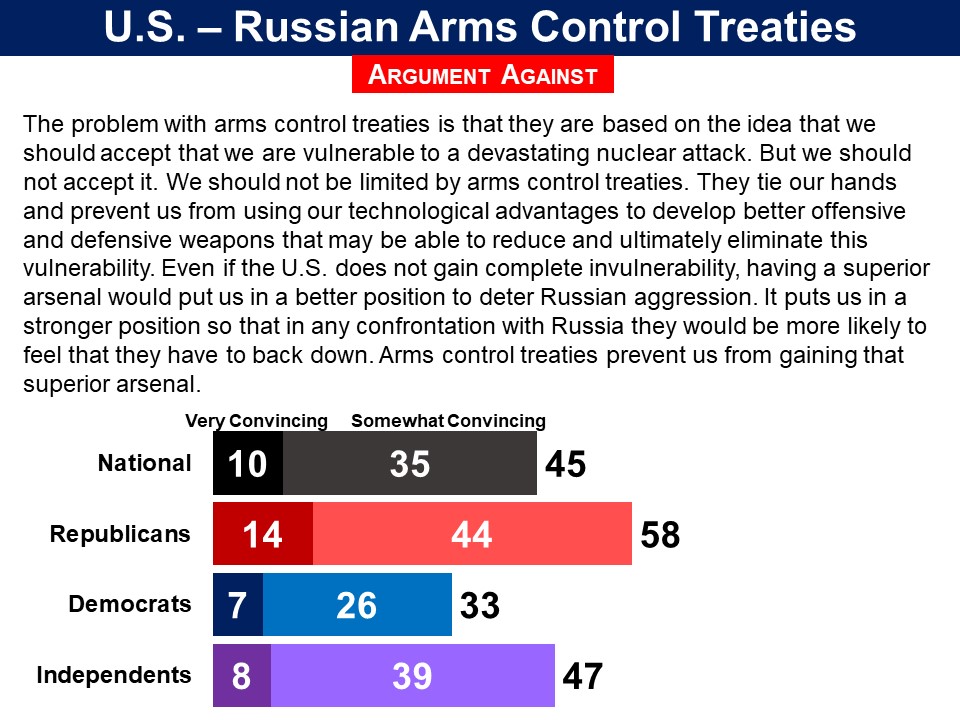 After reviewing the arguments, respondents were asked whether or not they approved of “the U.S. continuing to have arms control treaties with Russia.” Over four in five (83%) supported continuation-- a much larger majority than either argument gained.
After reviewing the arguments, respondents were asked whether or not they approved of “the U.S. continuing to have arms control treaties with Russia.” Over four in five (83%) supported continuation-- a much larger majority than either argument gained.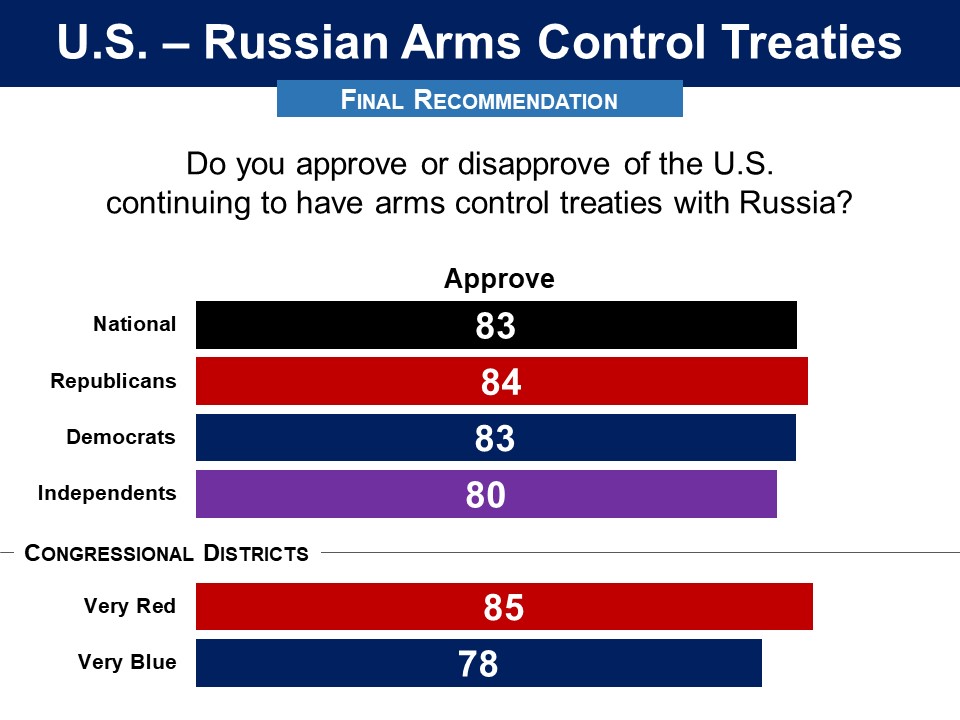
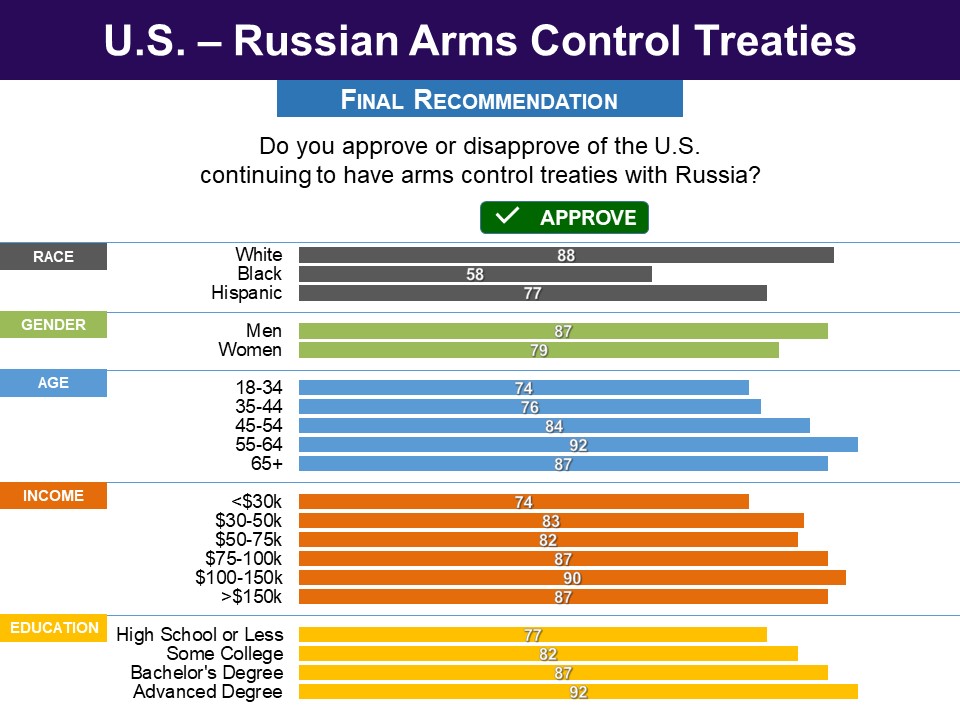 Interestingly, the number supporting continuing to have arms control treaties with Russia was even higher than the number who found the argument in favor convincing, suggesting that there may be more reasons that people support arms control treaties than those expressed in the argument.
Interestingly, the number supporting continuing to have arms control treaties with Russia was even higher than the number who found the argument in favor convincing, suggesting that there may be more reasons that people support arms control treaties than those expressed in the argument.


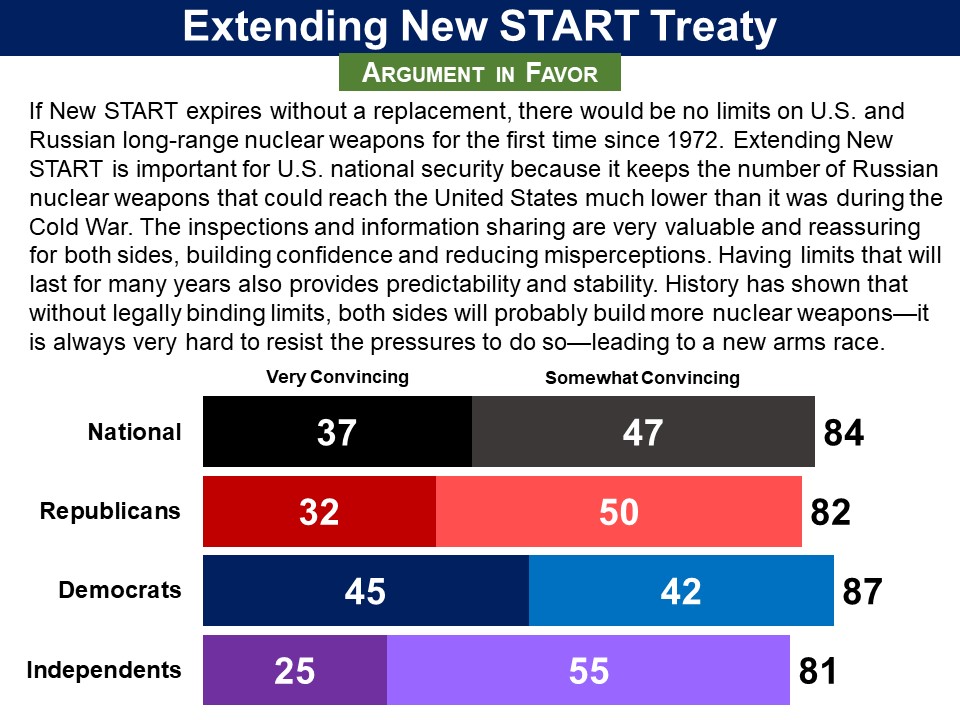
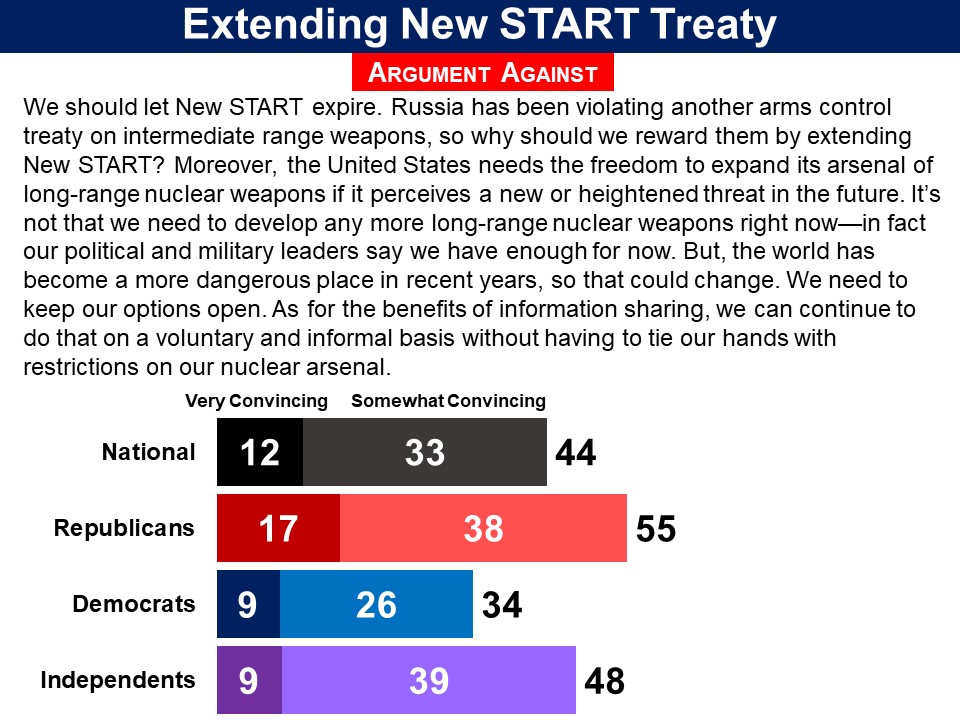 Asked to decide whether they favored or opposed extending New START, an overwhelming four in five (82%) supported extension. Three in four Republicans (77%) and independents (74%) likewise supported it, as did 72% of Trump voters and 89% of Democrats.
Asked to decide whether they favored or opposed extending New START, an overwhelming four in five (82%) supported extension. Three in four Republicans (77%) and independents (74%) likewise supported it, as did 72% of Trump voters and 89% of Democrats.




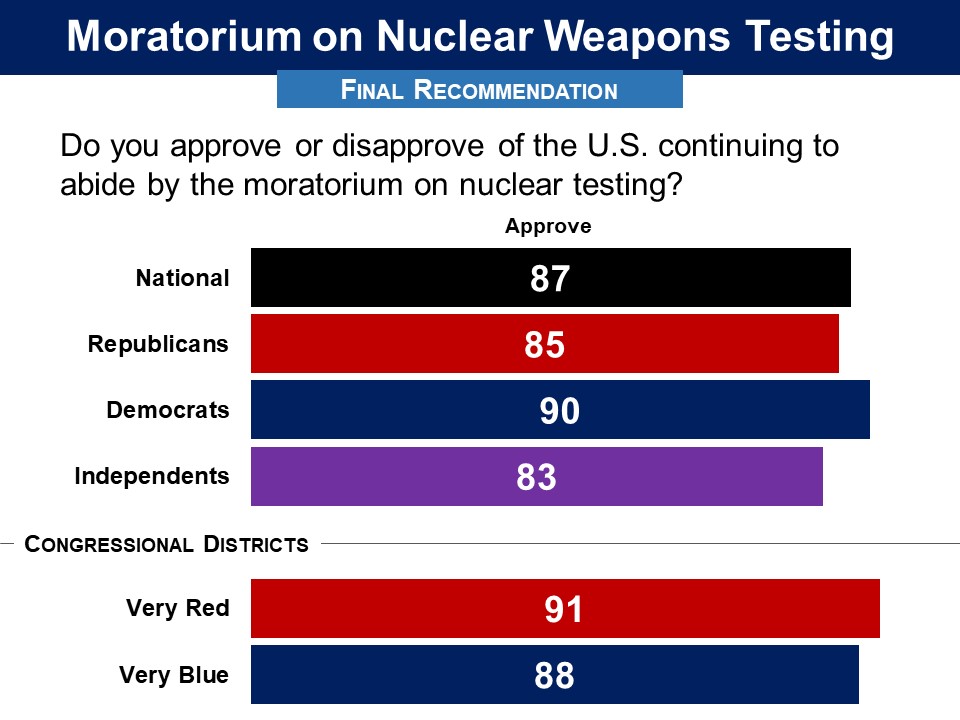
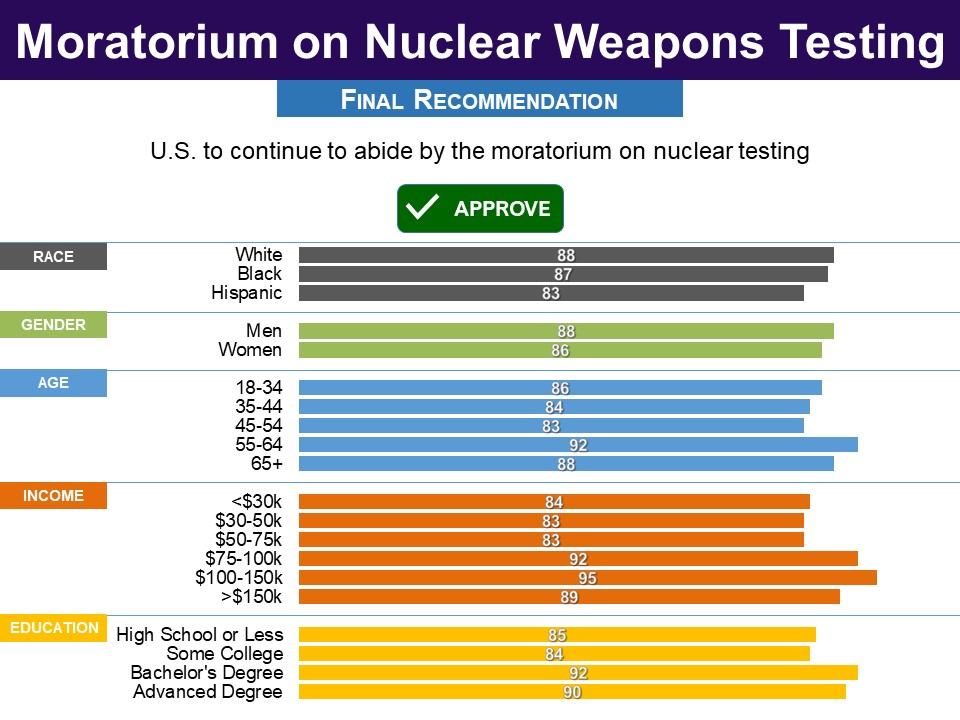 Related Standard Polls
Related Standard Polls

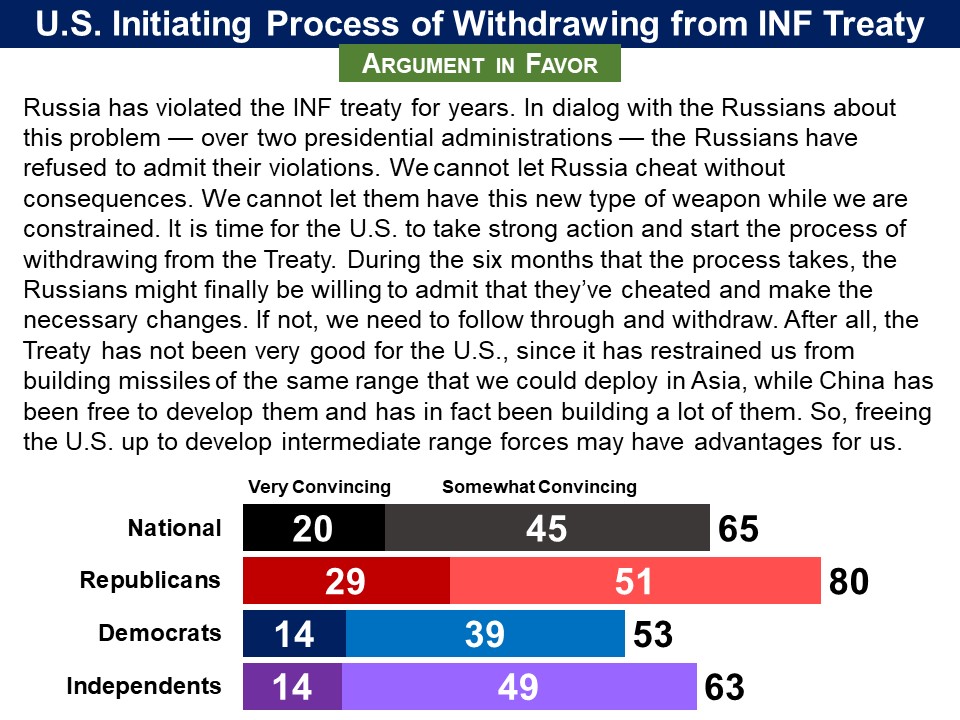
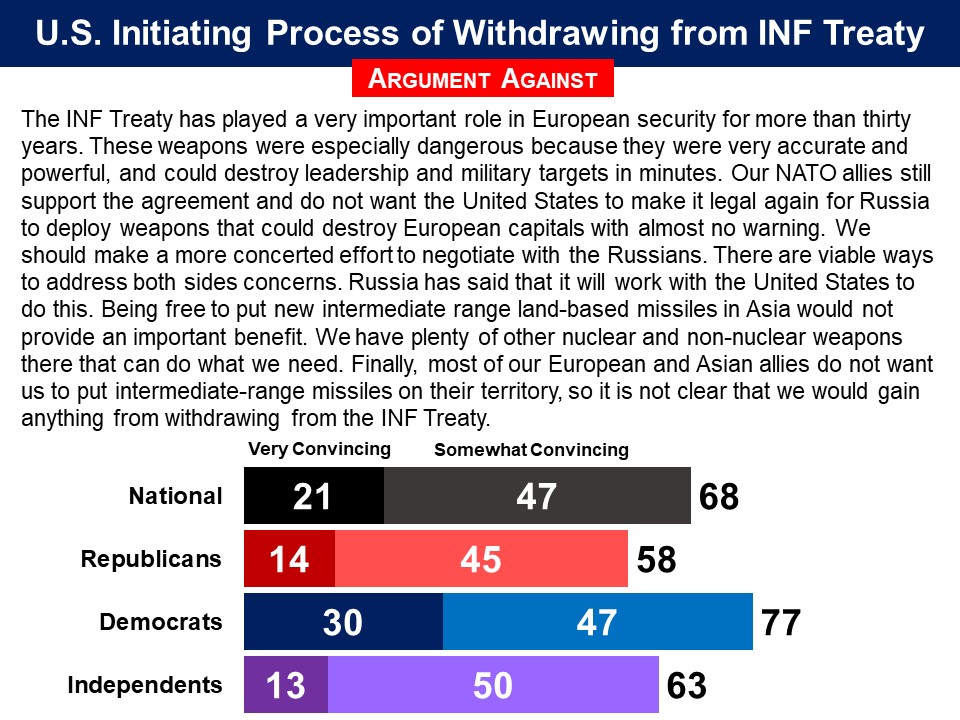 Respondents were then asked to choose between two courses of action:
Respondents were then asked to choose between two courses of action: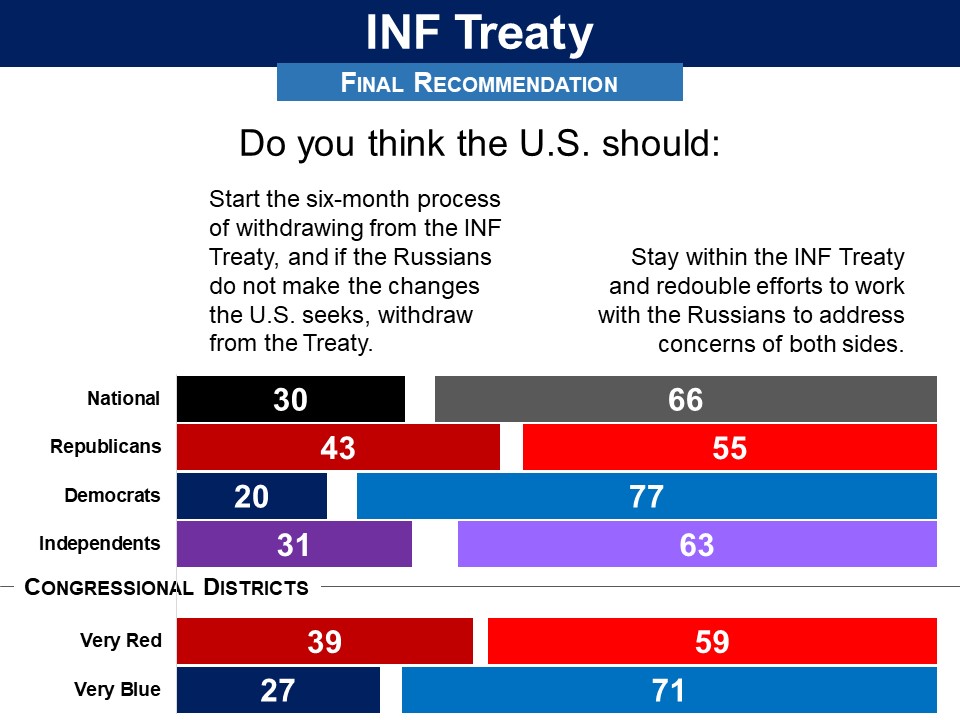
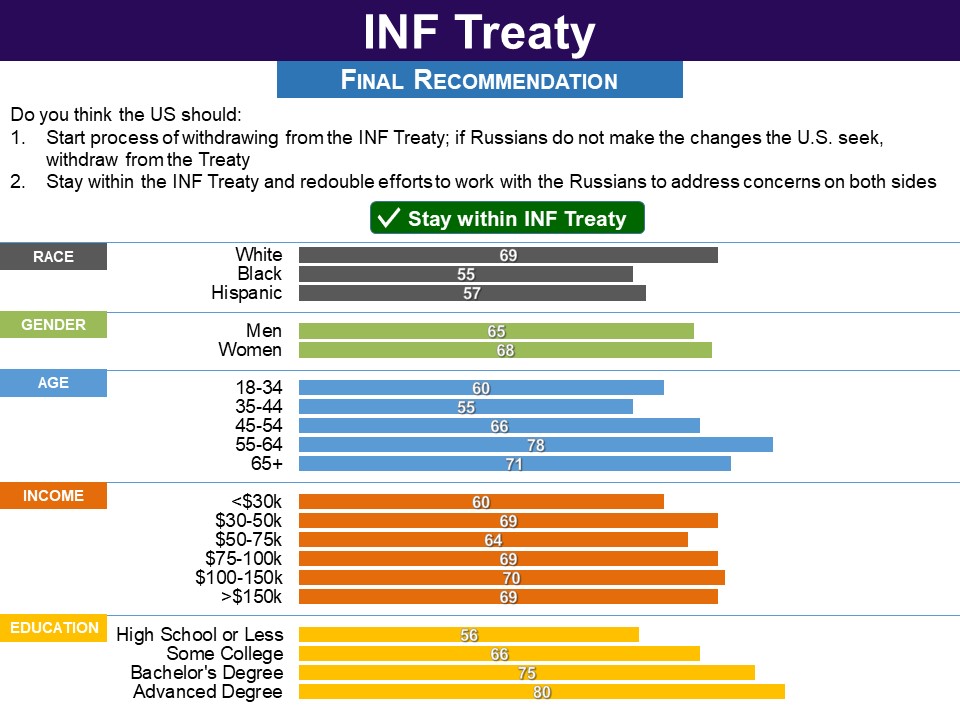 Status of Proposal
Status of Proposal


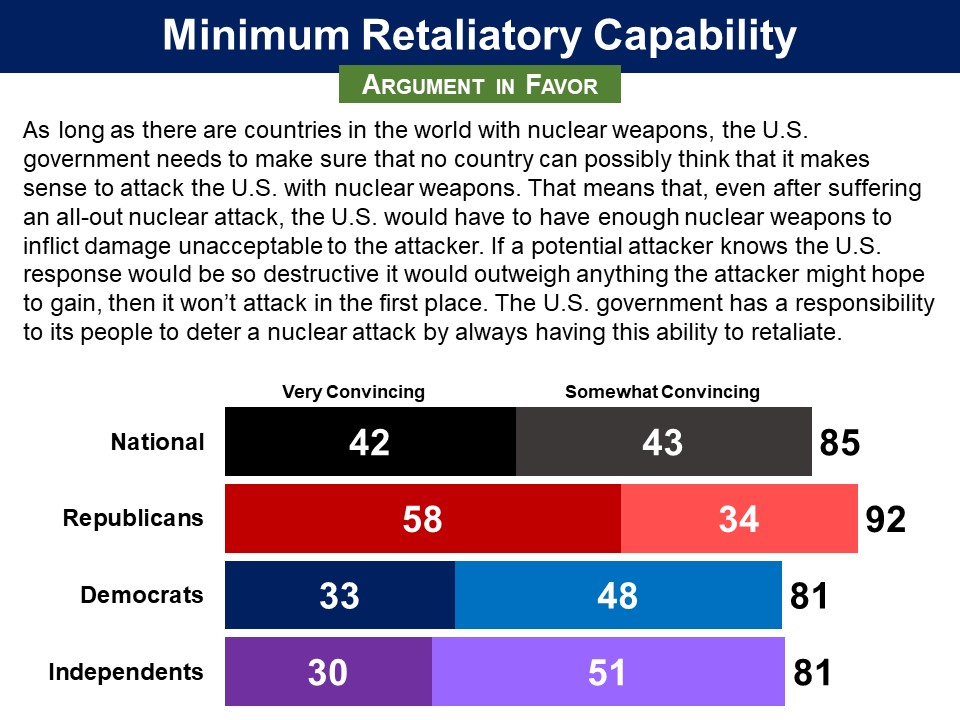
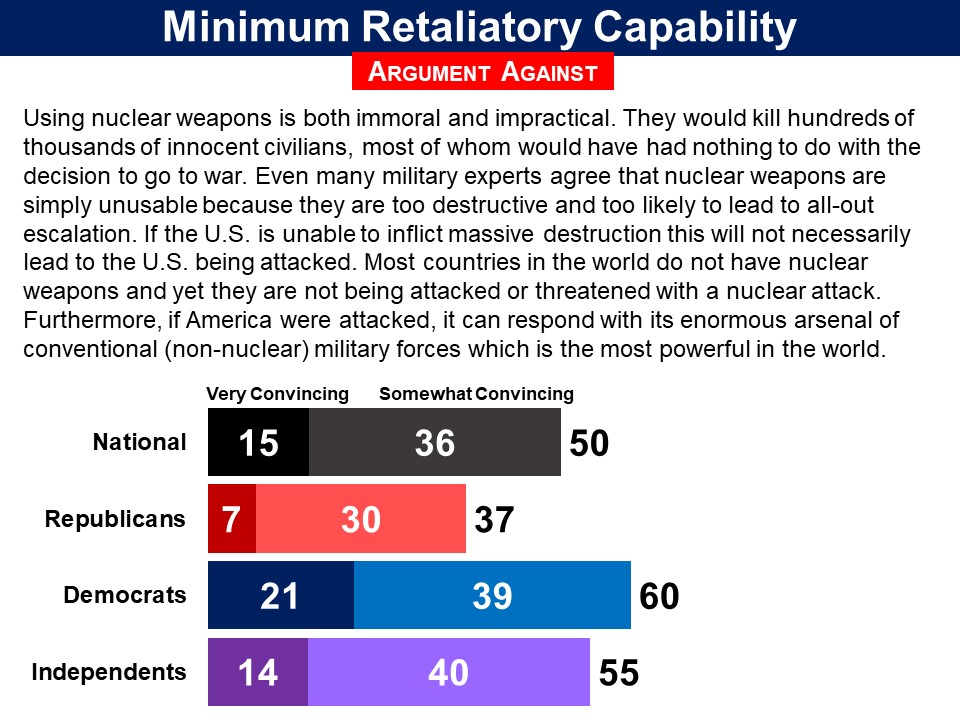 Finally, respondents were asked whether the U.S. should maintain a nuclear arsenal that, at a minimum, met the given criteria. Eighty-five percent said the U.S. should: Republicans were highest at 94%; Democrats were at 79% and independents, 80%.
Finally, respondents were asked whether the U.S. should maintain a nuclear arsenal that, at a minimum, met the given criteria. Eighty-five percent said the U.S. should: Republicans were highest at 94%; Democrats were at 79% and independents, 80%.

 Related Standard Polls
Related Standard Polls


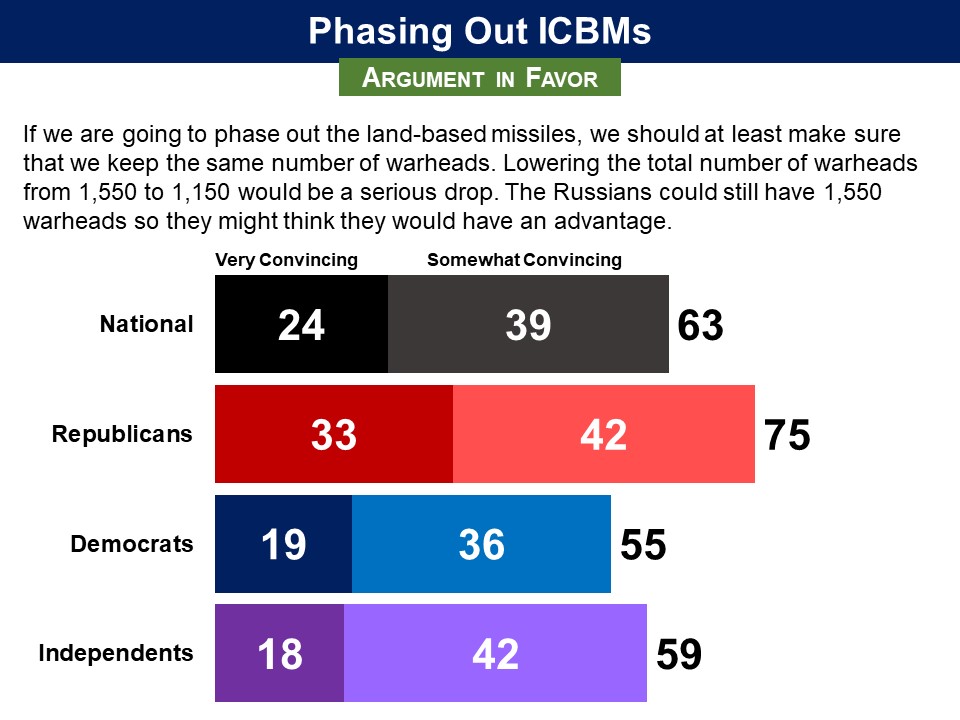 For the counter-argument, a majority (56%) found it convincing, but for Democrats a large majority (65%) found it convincing, more convincing than the pro argument. But among Republicans this was only 42%.
For the counter-argument, a majority (56%) found it convincing, but for Democrats a large majority (65%) found it convincing, more convincing than the pro argument. But among Republicans this was only 42%.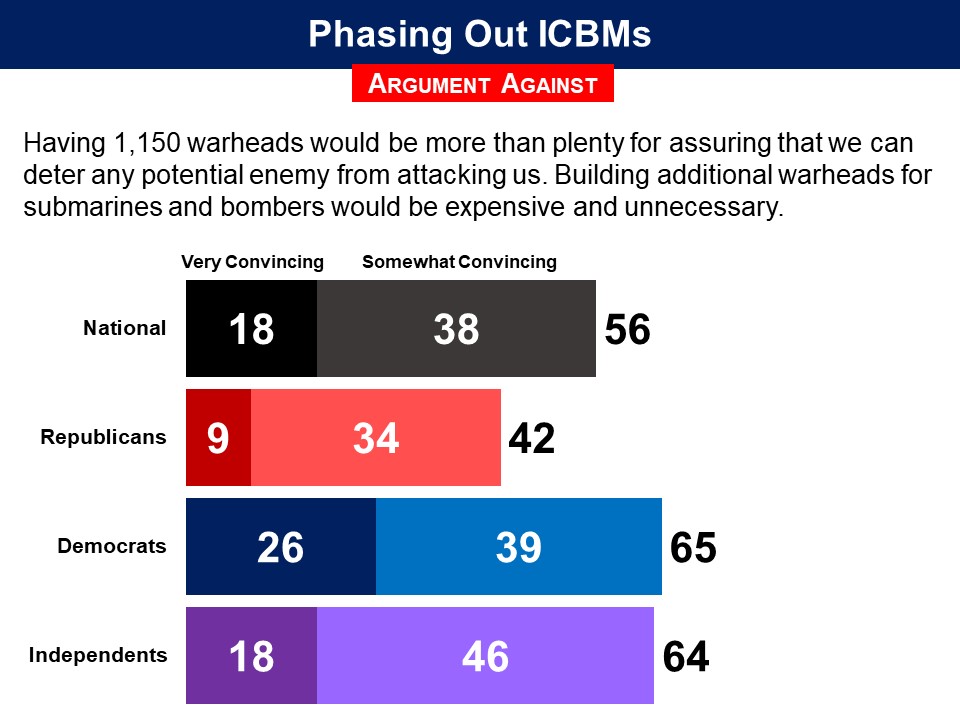 Finally, respondents selected among three options including the cost estimates developed by the Congressional Budget Office.
Finally, respondents selected among three options including the cost estimates developed by the Congressional Budget Office. 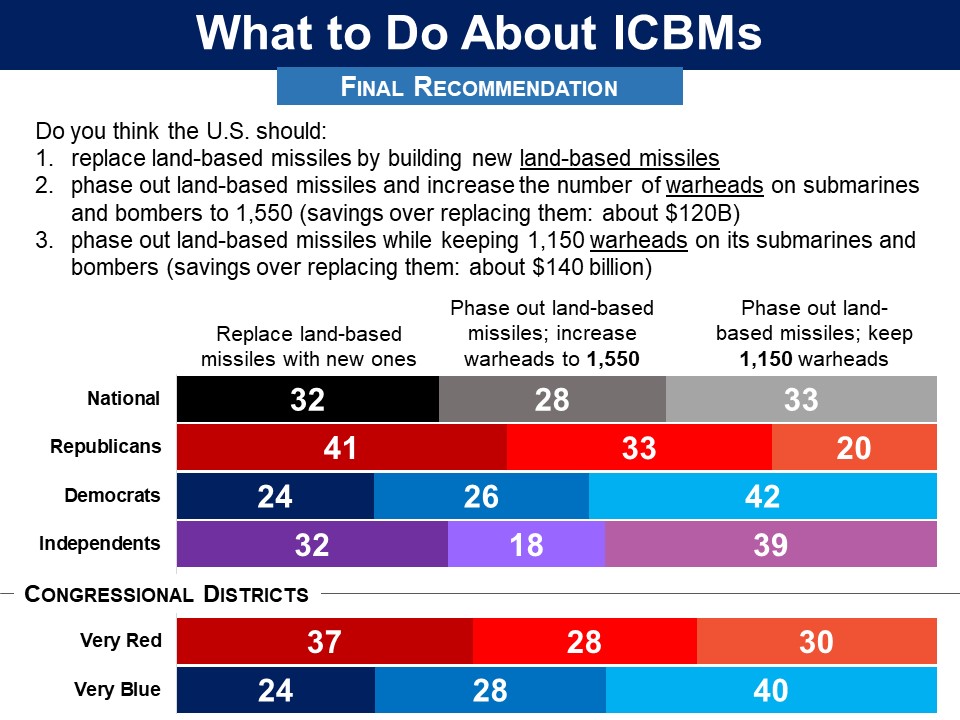




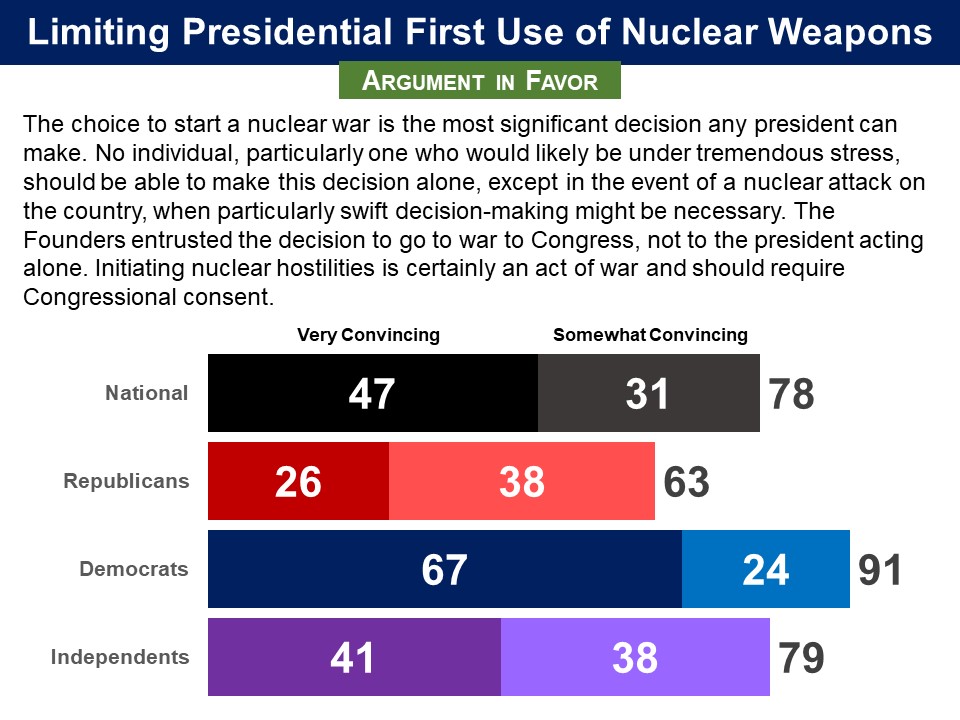
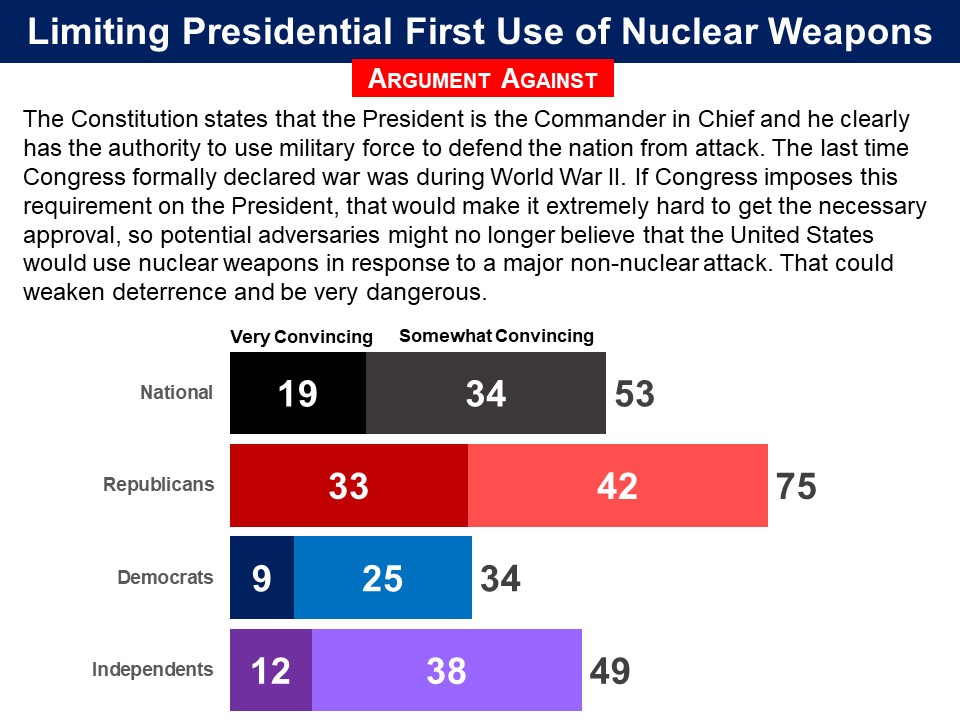 Respondents were then asked whether Congress should or should not pass a law saying that:
Respondents were then asked whether Congress should or should not pass a law saying that: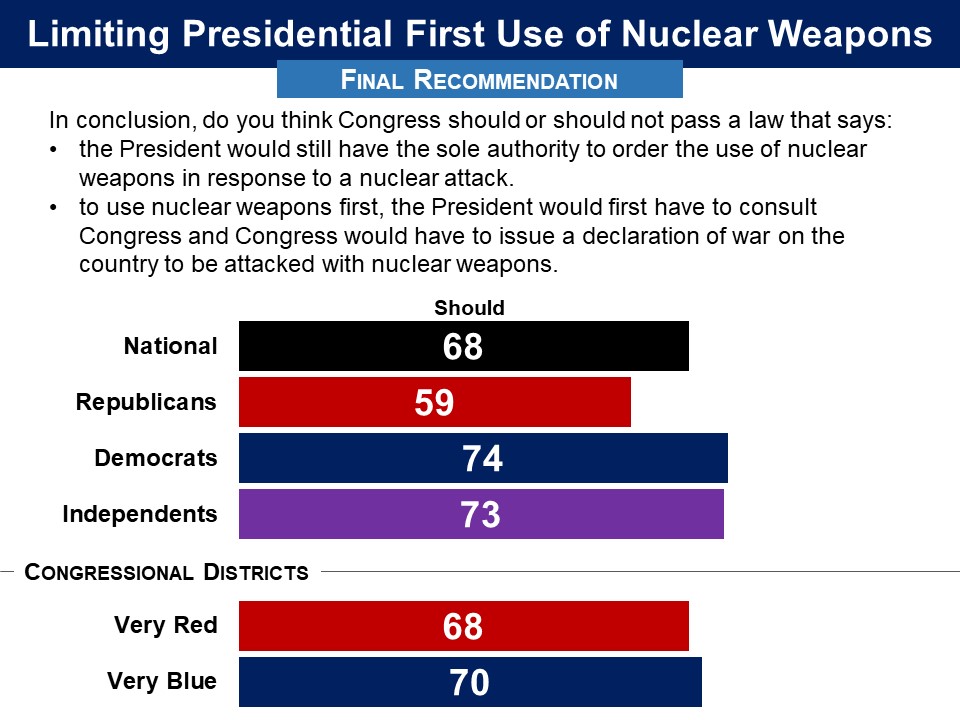
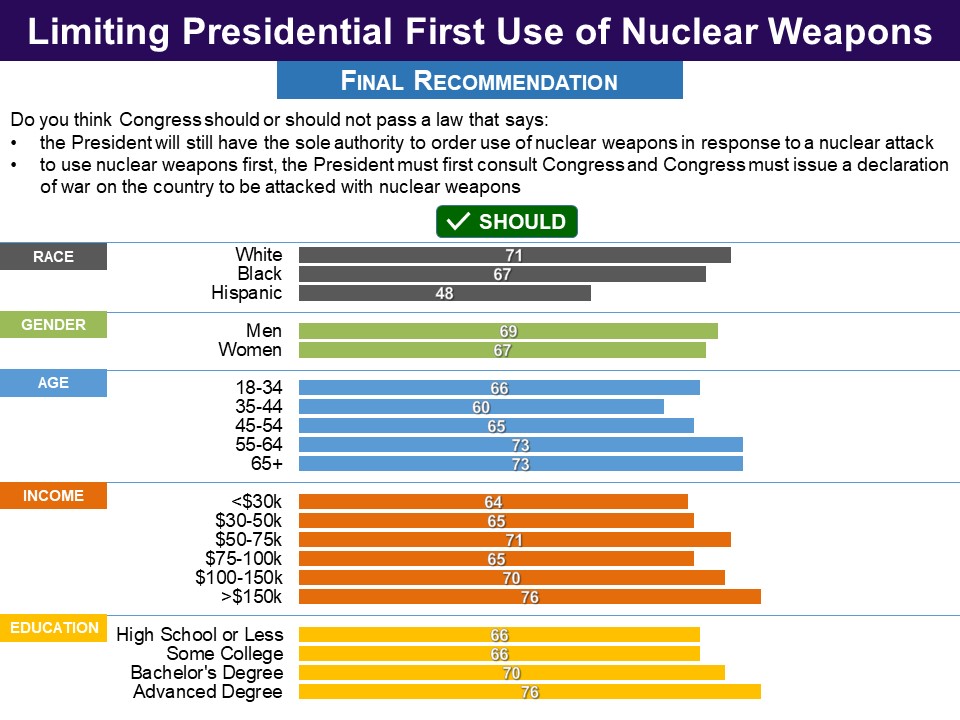 Status of Legislation
Status of Legislation
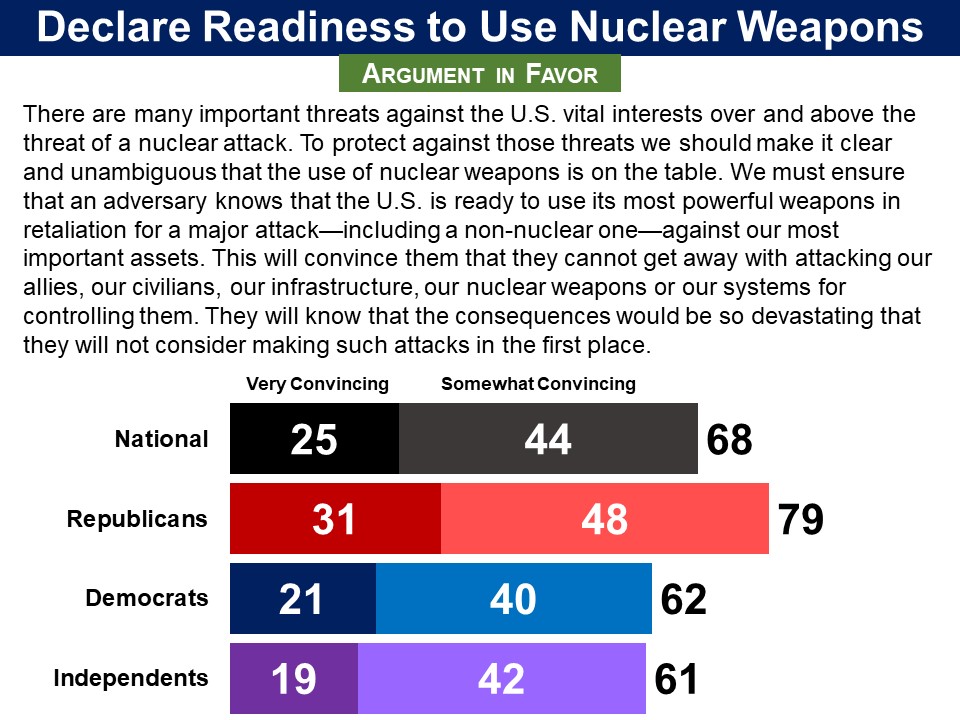 The counter-argument had about the same potency as the pro argument, with 70% finding it convincing, including majorities in both parties.
The counter-argument had about the same potency as the pro argument, with 70% finding it convincing, including majorities in both parties.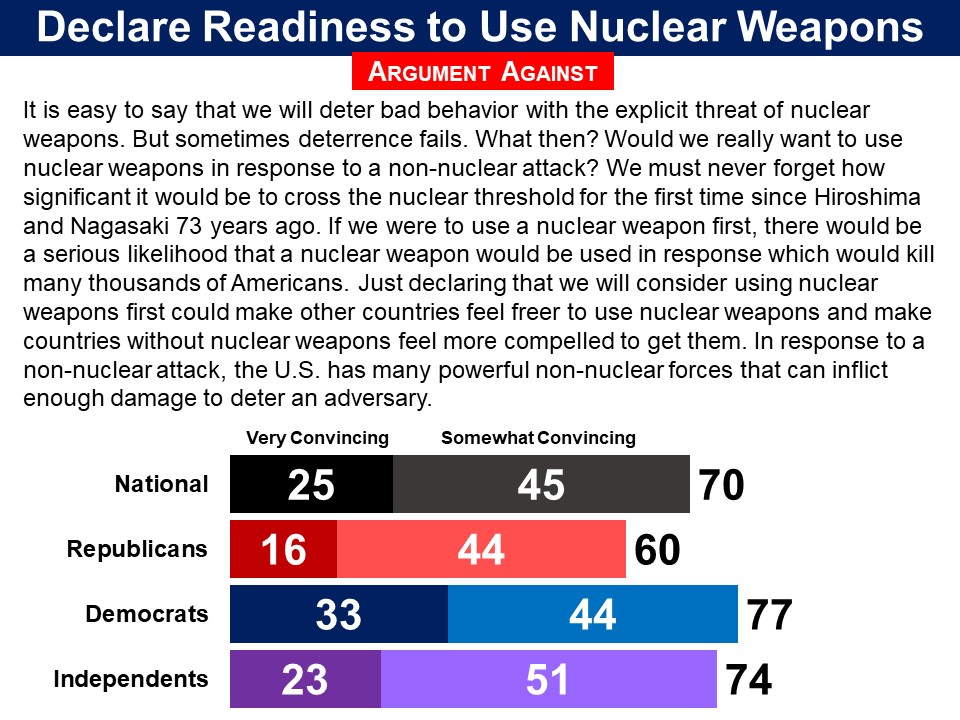 Next, respondents evaluated pro and con arguments for a policy shift in the opposite direction—the U.S. declaring that it will never use nuclear weapons first. The argument for making a “no first use” declaration was, like the others, found convincing on a bipartisan basis by two thirds. The counter argument did slightly less well than the preceding three, with 63% finding it convincing.
Next, respondents evaluated pro and con arguments for a policy shift in the opposite direction—the U.S. declaring that it will never use nuclear weapons first. The argument for making a “no first use” declaration was, like the others, found convincing on a bipartisan basis by two thirds. The counter argument did slightly less well than the preceding three, with 63% finding it convincing.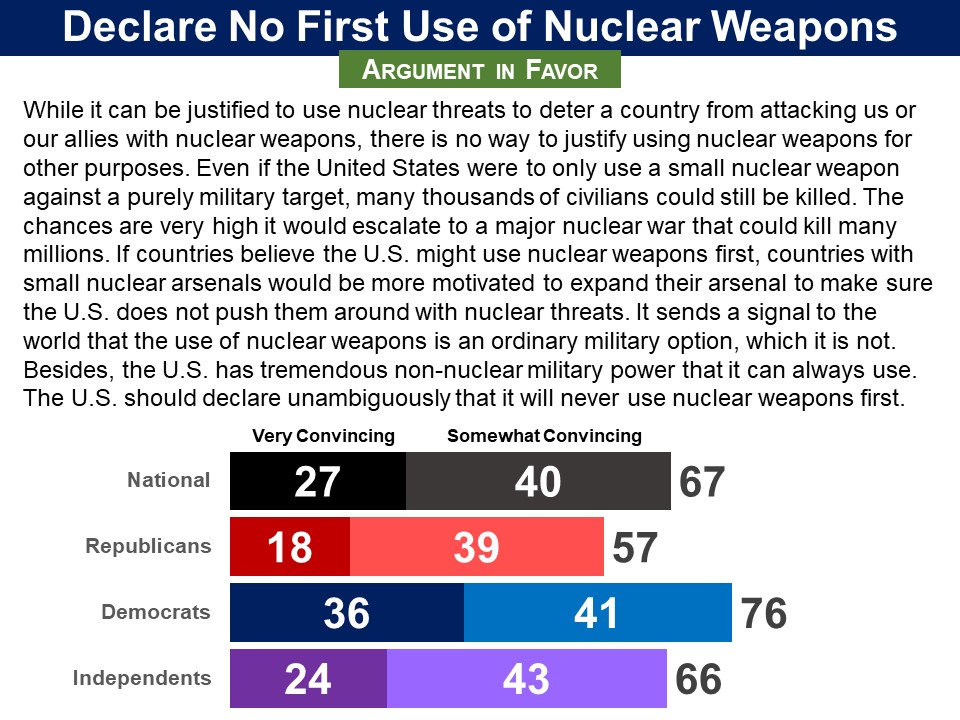
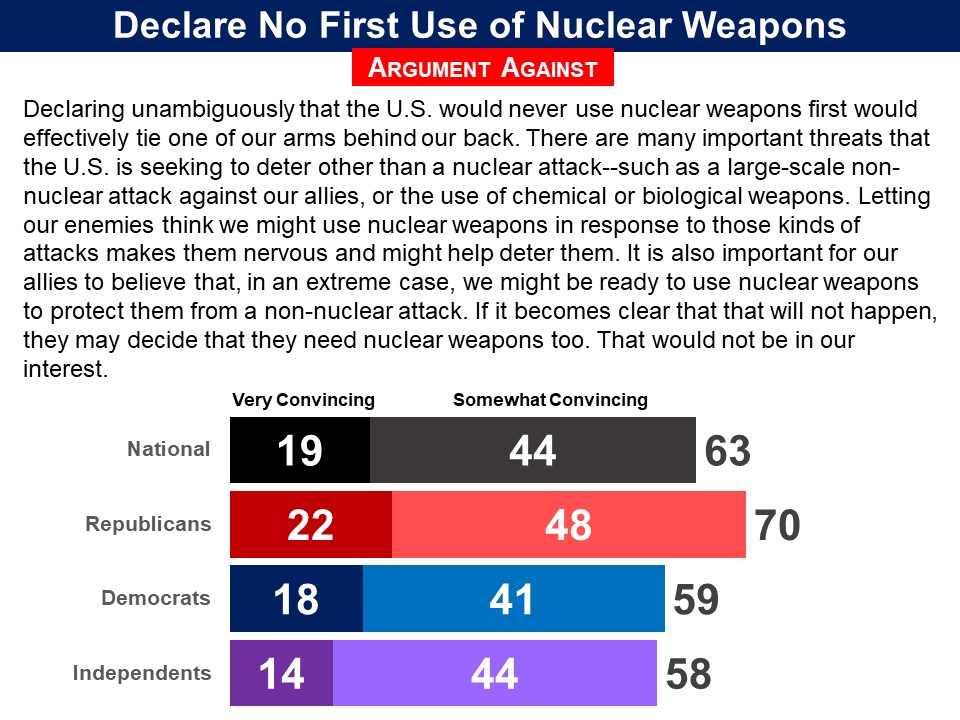 Finally, respondents were asked to make a choice from all three options discussed. The proposal to “Explicitly declare that the U.S. would consider using nuclear weapons first and state what kinds of non-nuclear attacks would prompt the U.S. to consider doing so,” was endorsed by just 18%, including 20% of Republicans and 16% of Democrats.
Finally, respondents were asked to make a choice from all three options discussed. The proposal to “Explicitly declare that the U.S. would consider using nuclear weapons first and state what kinds of non-nuclear attacks would prompt the U.S. to consider doing so,” was endorsed by just 18%, including 20% of Republicans and 16% of Democrats. 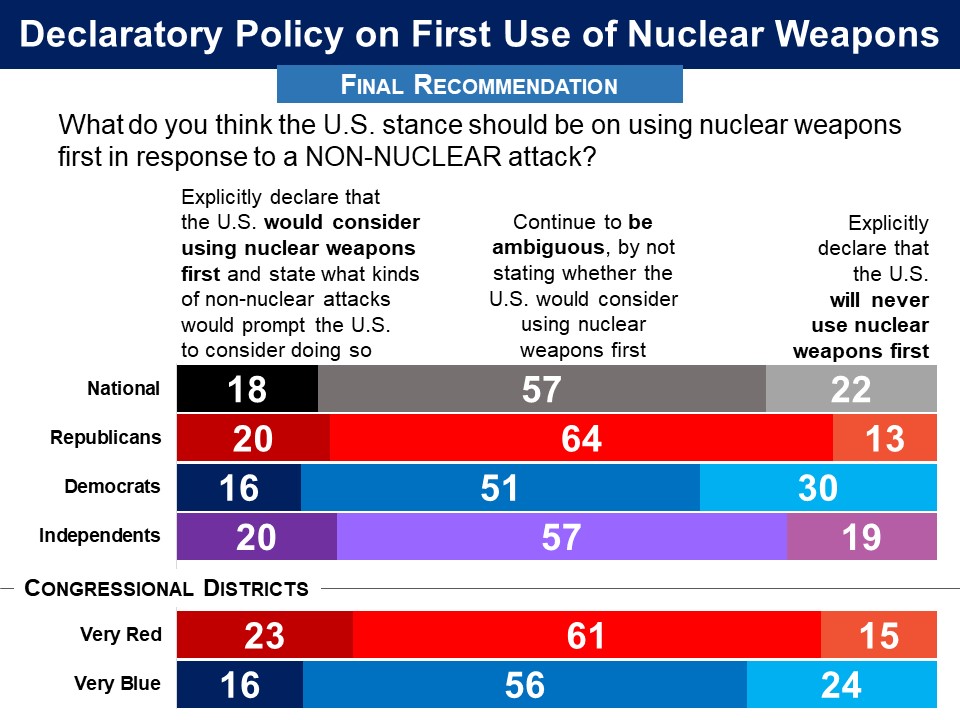
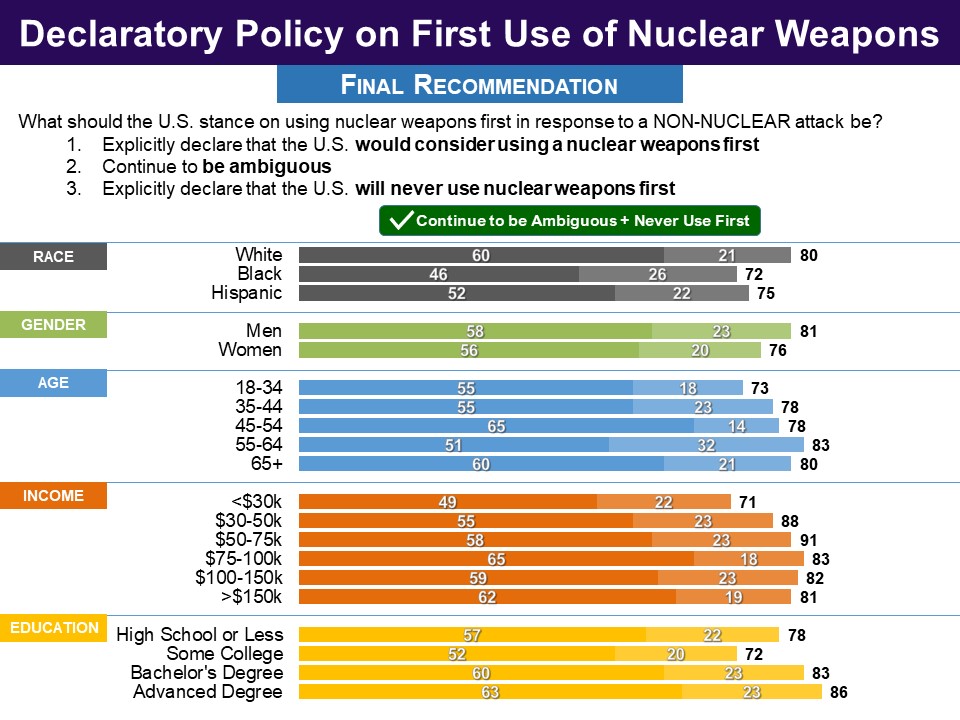 Related Standard Polls
Related Standard Polls

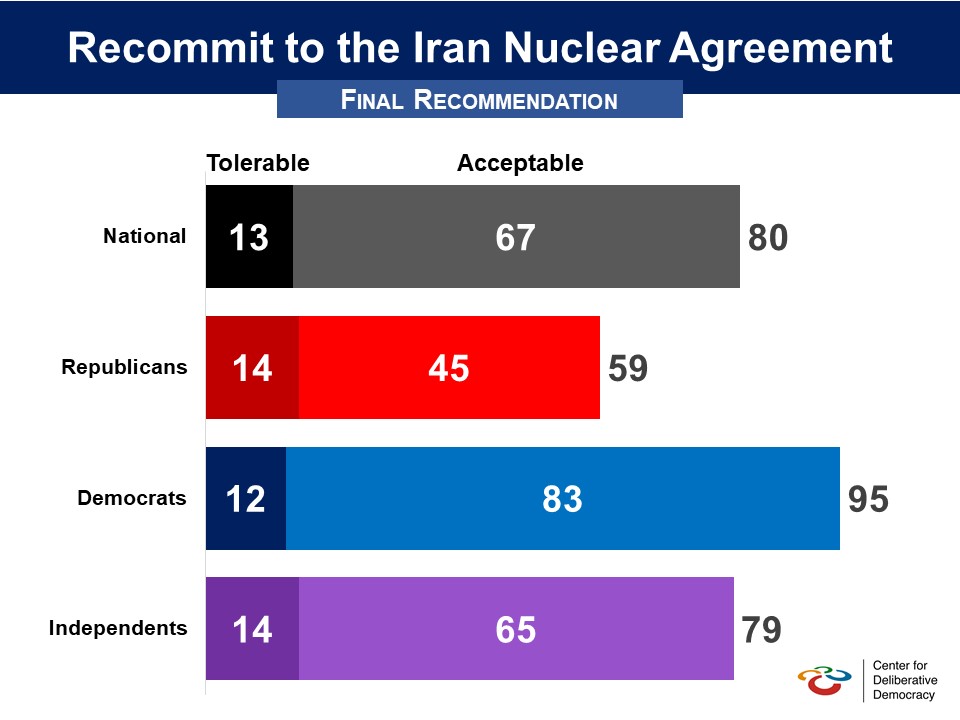 Pre-Deliberation Poll
Pre-Deliberation Poll